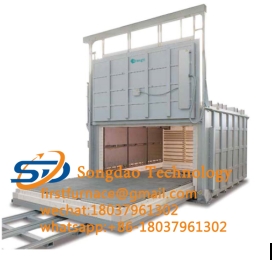- 16
- Mar
What are the selection methods of high temperature trolley furnace
What are the selection methods of উচ্চ তাপমাত্রার ট্রলি চুল্লি
High temperature trolley furnace is only needed in some specific occasions. When choosing a stove, you must first choose from the stove type. The basic principle of the furnace type: when the product is fixed and mass production, a continuous furnace or a rotary hearth furnace with high productivity and high thermal efficiency can be considered.

The nature of production For non-professional forging workshops that do not have furnace products, due to frequent changes in product types, blank sizes, etc., the productivity of forging equipment is changed, which requires heating equipment to adapt to it, and high-temperature trolley furnaces should have Greater flexibility. For workshops where single-piece or small-batch production and product types often change, chamber furnaces should be considered first.
The types of fuel used for high-temperature trolley furnaces must abide by the national energy policy on the one hand, and at the same time, try to obtain local materials as much as possible. If there are special requirements on heating quality and productivity, the selection of fuel types needs to be considered. For example, if you want to use the rotary bottom high temperature trolley furnace for batch heating, you cannot burn coal. The type of metal to be heated is different, and the heating process is also different.
For non-ferrous metals and their alloys, heat-resistant steel, etc., muffle furnaces are generally not used, but electric heating should be considered. For alloy steel, when preheating is required, a double-chamber furnace is used. If it is larger, a semi-continuous pusher furnace can be used. For large workpieces (above 1 ton) or large steel ingots, in order to facilitate the loading and unloading of the workpiece, the industrial furnace car hearth furnace can be considered. Therefore, it is necessary to select the appropriate high-temperature car furnace type according to the type of metal to be heated.
